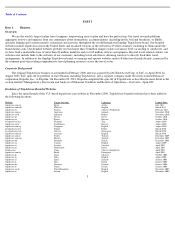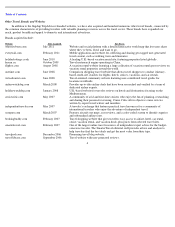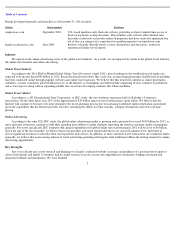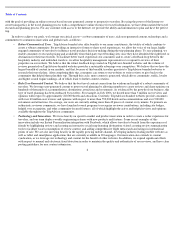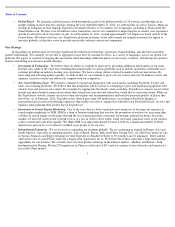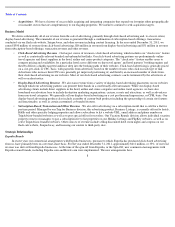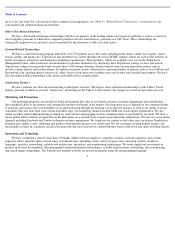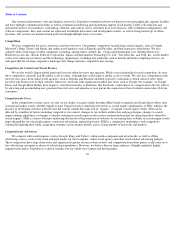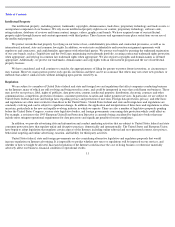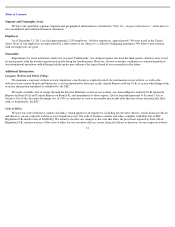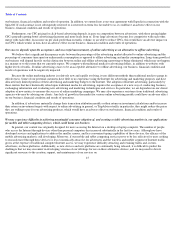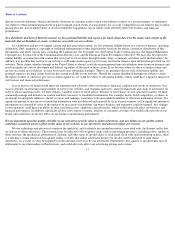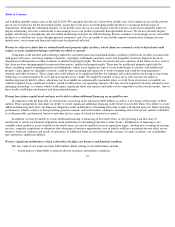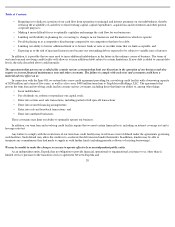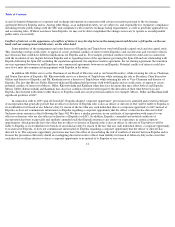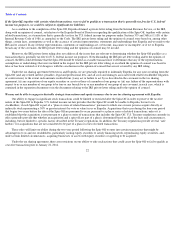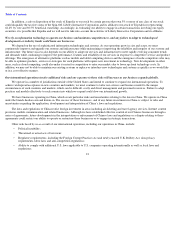TripAdvisor 2011 Annual Report Download - page 17
Download and view the complete annual report
Please find page 17 of the 2011 TripAdvisor annual report below. You can navigate through the pages in the report by either clicking on the pages listed below, or by using the keyword search tool below to find specific information within the annual report.
Table of Contents
An investment in our Common Stock involves risks. You should consider carefully the risks described below together with all of the other
information included in this Annual Report on Form 10-K. This Annual Report on Form 10-K contains forward-looking statements that contain
risks and uncertainties. Please refer to the section entitled “Cautionary Note Regarding Forward-Looking Statements” on page 1 of this Annual
Report on Form 10
-K in connection with your consideration of the risk factors and other important factors that may affect future results
described below.
If we are unable to continue to increase visitors to our websites and to cost
-effectively convert these visitors into repeat users or contributors,
our advertising revenue could decline.
The primary asset that we use to attract traffic to our websites and convert these visitors into repeat users is the content created by users of
our websites, particularly such content’s volume, unique nature and organization. Our success in attracting users depends, in part, upon our
continued ability to collect, create, organize and distribute high-quality, commercially valuable content in a cost-effective manner at a scale that
connects consumers with content that meets their specific interests and enables them to share and interact with the content and supporting
communities. There can be no assurances that we will continue to receive content in a cost-effective manner or in a manner that timely meets
rapidly changing consumer demand, if at all. Any failure to obtain such content could adversely affect user experiences and reduce traffic driven
to our websites, which would make our websites less attractive to advertisers. Any change in the cost structure pursuant to which we obtain our
content currently, or in travelers’ relative appreciation of user-based versus expert content, could negatively impact our business and financial
performance.
We are subject to periodic changes in search engine algorithms and methodologies and changes in search query trends and display results.
Our failure to successfully manage our SEO strategy could result in a substantial decrease in traffic to our websites, as well as increased costs if
we were to replace free traffic with paid traffic. Actions beyond our control, such as changes to algorithms by search engine providers such as
Google, Bing or Baidu for competitive or other purposes could also negatively impact the ranking of our websites in search engine results.
Even if we succeed in driving traffic to our websites, neither we nor our advertisers or partners may be able to monetize this traffic or
otherwise retain consumers. Our failure to do so could result in decreased users and related advertising revenue. Any or all of the above results
would adversely affect our business and financial performance.
Our businesses could be negatively affected by changes in search engine algorithms and dynamics, or search engine disintermediation.
We rely heavily on Internet search engines such as Google, including through the purchase of travel-
related keywords, to generate traffic to
our websites. We obtain a significant amount of traffic via search engines and, therefore, utilize techniques such as SEO and SEM to improve
our placement in relevant search queries. Search engines, including Google, frequently update and change the logic that determines the
placement and display of results of a user’s search, such that the purchased or algorithmic placement of links to our websites can be negatively
affected. Moreover, a search engine could, for competitive or other purposes, alter its search algorithms or results causing our websites to place
lower in search query results. If a major search engine changes its algorithms in a manner that negatively affects our paid or unpaid search
ranking, or if competitive dynamics impact the effectiveness of SEO or SEM in a negative manner, our business and financial performance
would be adversely affected, potentially to a material extent.
In addition, to the extent that Google (including Google Places and Google Hotel Finder, and a recently launched comparison travel tool),
Bing (including Bing Travel), or other leading search or meta-
search engines that have a significant presence in our key markets, disintermediate
online travel agencies or travel content
13
Item 1A.
Risk Factors


